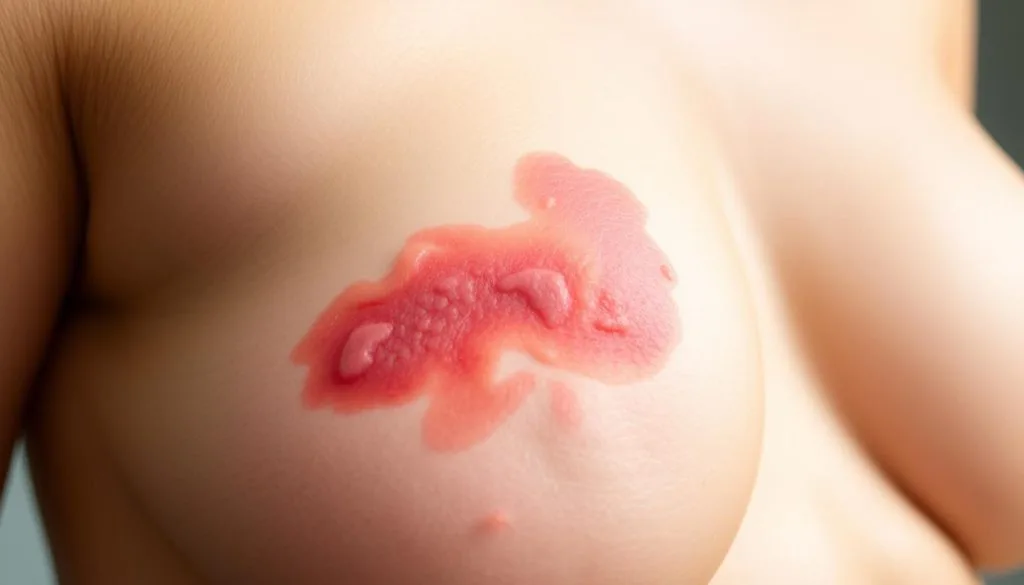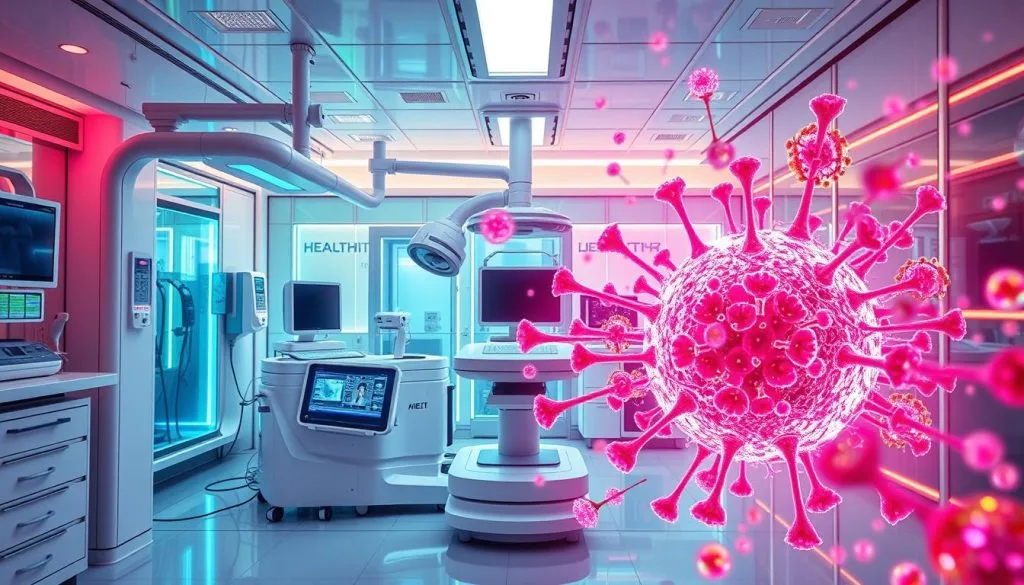Inflammatory breast cancer is a rare and aggressive disease. It demands our attention and understanding. We aim to raise breast cancer awareness by highlighting its symptoms and treatments. Knowledge is key to fighting this disease.
Education is crucial in fighting this disease. Learning about inflammatory breast cancer is urgent. We aim to educate and support those affected by it.
Key Takeaways
- IBC is a rare yet aggressive form of cancer necessitating prompt recognition and response.
- Increasing breast cancer awareness is instrumental in combating the progression of IBC.
- Understanding the signs can lead to swifter breast cancer treatment and better outcomes.
- Education is a potent tool in recognizing breast cancer symptoms and taking timely action.
- A united front in education and resource sharing is vital for supporting those affected by IBC.
- Advancements in treatment offer hope and new possibilities for individuals facing inflammatory breast cancer.
- Support networks play a crucial role in the emotional well-being of patients and their families.
Understanding Inflammatory Breast Cancer
Inflammatory breast cancer is a rare but aggressive form of breast cancer. It’s important to know about it because it’s different from other types. As we learn more about breast cancer, understanding this form is key.
What Sets Inflammatory Breast Cancer Apart
Inflammatory breast cancer doesn’t look like other breast cancers. It’s marked by redness, swelling, and skin that looks like an orange peel. It’s often mistaken for infections, so it needs quick attention and a thorough check-up.
The Prevalence and Impact of Inflammatory Breast Cancer
Inflammatory breast cancer is less common but has a big impact. It makes up 1-5% of breast cancer cases in the U.S. but has a higher death rate. This shows we need more research and early detection efforts.
Dealing with inflammatory breast cancer also brings up mental and social challenges. Patients need strong support and awareness efforts. This helps improve their outlook and life quality.
| Aspect | Inflammatory Breast Cancer | Other Breast Cancers |
|---|---|---|
| Initial Symptoms | Redness, swelling, pitted skin | Lumps, minor pain |
| Common Misdiagnosis | Infections (e.g., mastitis) | Often correctly diagnosed |
| Treatment Urgency | High | Variable |
| Patient Awareness Need | Critical | Important |
Inflammatory breast cancer has its own challenges and needs. We must keep learning and improving treatments and support. By doing more research and raising awareness, we can make a difference in fighting this aggressive cancer.
Risk Factors and Causes of Inflammatory Breast Cancer
Understanding inflammatory breast cancer means looking at many risk factors. This cancer is aggressive and can be influenced by genetics and lifestyle. We will look at the breast cancer risk factors that increase the chance of getting this rare cancer.
Genetics: Genetics are key in inflammatory breast cancer. Genes like BRCA1 and BRCA2 can raise risk. Family history also plays a role.
Age and Gender: Breast cancer is common in older women and can affect men too. But, inflammatory breast cancer often hits middle-aged women.
Lifestyle Factors: Diet, weight, and exercise can affect breast cancer risk. Being overweight and not exercising can increase risk.
“Inflammatory breast cancer is less common than other types of breast cancer but it is notably aggressive. Understanding its causes helps in early detection and treatment.”
Environmental Factors: Some chemicals and radiation can raise breast cancer risk. Jobs that expose you to endocrine disruptors are especially risky.
Here’s a detailed look at risk factors for inflammatory breast cancer, focusing on genetics and lifestyle:
| Risk Factor | Description | Impact Level |
|---|---|---|
| Genetics | Mutations in BRCA1 and BRCA2 | High |
| Age | Typically affects women aged 40-60 | Medium |
| Gender | Primarily affects women | High |
| Lifestyle | Obesity, poor diet, lack of exercise | High |
| Environmental | Exposure to endocrine disruptors | Medium |
To lower the risk of inflammatory breast cancer, we need healthcare, lifestyle changes, and understanding our medical history. Regular check-ups and a healthy lifestyle can help prevent this serious disease.

Early Signs and Identification
Understanding inflammatory breast cancer (IBC) is key. Early signs and quick action are crucial for better outcomes. This part talks about how to spot breast cancer symptoms early and why it’s so important.
Recognizing the Initial Symptoms of Inflammatory Breast Cancer
Spotting breast cancer symptoms early can improve treatment chances. IBC is different from other breast cancers, so knowing the signs is vital. Here are some early warning signs:
- Swelling or redness covering one third or more of the breast
- The breast may feel unusually warm and appear inflamed
- A thickening of skin on the breast, resembling an orange peel
- Sudden changes in the size or contour of the breast
- Inversion or flattening of the nipple
- Persistent itching or tenderness that does not resolve
The Importance of Early Detection in Breast Cancer Prognosis
Early detection is crucial for managing IBC. Catching this aggressive cancer early leads to better treatment plans. Ways to find cancer early include:
- Regular clinical exams and discussions about breast health
- Immediate consultation following any noticeable changes in breast appearance or comfort
- Advanced imaging tests if IBC is suspected, despite the absence of lumps
Knowing about these symptoms and taking action can save lives. It encourages quick medical visits.
Spotting signs and staying on top of screenings can change treatment outcomes. It can also increase survival rates. Everyone, especially those at higher risk, should watch their breasts closely and see a doctor if they notice any changes.
Inflammatory Breast Cancer: A Closer Look at Symptoms
Inflammatory breast cancer (IBC) has unique and aggressive breast cancer symptoms. It’s different from other breast cancers because of its symptoms and how fast it grows. Knowing these symptoms is key to catching it early and treating it right.
One key symptom of IBC is a red and swollen breast, often thought to be an infection. Unlike other breast cancers, IBC might feel thick or heavy in the breast. These symptoms show how serious IBC is and why you need to see a doctor right away.
Early detection of these symptoms can significantly impact the treatment outcomes for inflammatory breast cancer.
For more information on IBC and its symptoms, check out this detailed resource.

| Symptoms | Description | Typical Onset |
|---|---|---|
| Redness | Looks similar to an infection, covering one-third of the breast | Rapid, over weeks |
| Swelling | Significant increase in breast size | Sudden |
| Skin Texture Change | Skin may appear pitted, similar to an orange peel | Noticeable quickly |
| Pain | Constant ache or tenderness in the breast | Develops early |
| Inverted Nipple | Nipple turns inward instead of protruding | Can occur as disease progresses |
If you notice these breast cancer symptoms, you need to see a doctor fast. These symptoms can look harmless or like other less serious issues. This makes IBC especially dangerous and often mistaken for something else.
Inflammatory Breast Cancer Stages and Diagnosis
It’s important to understand how inflammatory breast cancer progresses and get an accurate diagnosis. This helps doctors create the best treatment plans. We’ll look at the stages of this cancer and how doctors diagnose it.
Differentiating Stages of Inflammatory Breast Cancer
Knowing the stages of inflammatory breast cancer helps doctors figure out how serious it is. This cancer is rare and grows fast. It often doesn’t show up as a lump, making diagnosis key for treatment.
- Stage III: The cancer cells have spread into the nearby skin and lymph nodes but not to distant sites.
- Stage IV: The cancer has metastasized, impacting other parts of the body, indicating a more advanced and challenging scenario.
Diagnostic Procedures for Inflammatory Breast Cancer
When symptoms show up, people often see a doctor. Finding this fast-growing cancer involves several tests. These tests help doctors understand the cancer fully.
| Diagnostic Tool | Purpose | Common Uses in Inflammatory Breast Cancer |
|---|---|---|
| Biopsy | To confirm cancer through tissue sample | Identifying cancer cells, determining the subtype of breast cancer |
| Mammography | To visualize changes in breast tissue | Often supplemented by an ultrasound if the mammogram is inconclusive |
| Magnetic Resonance Imaging (MRI) | To provide a detailed image of breast tissues | Useful in assessing the extent of cancer spread locally |
| PET scan | To detect cancer spread to distant organs | Crucial for staging and evaluating treatment efficacy |
Each stage and test has its own role in managing and diagnosing inflammatory breast cancer. Doctors use these tools together. This teamwork helps patients get the best care possible.
Traditional and Emerging Treatment Options
The world of breast cancer treatment has changed a lot. It now combines old methods with new ones. This change shows how breast cancer research is always moving forward to help patients more.
Old treatments like surgery, chemo, and radiation are still key. They help deal with different types of breast cancer. But, new treatments like targeted therapy and immunotherapy are changing things. They offer more tailored and effective ways to fight cancer.

New research has brought about less invasive treatments and drugs. These new options target cancer cells without hurting healthy ones. This makes treatments better and reduces side effects.
| Treatment Type | Traditional | Emerging |
|---|---|---|
| Surgical Procedures | Mastectomy, Lumpectomy | Robotic-assisted surgery |
| Pharmacological Treatment | Chemotherapy | PARP inhibitors, Monoclonal antibodies |
| Radiation Therapy | External beam radiation | Intraoperative radiation |
| Genomic Medicine | Not applicable | Gene expression profiling |
The table shows how treatments are moving from general to specific. As breast cancer research keeps going, more options will be available. This brings hope and better chances of survival for patients everywhere.
Understanding Metastatic Breast Cancer
Breast cancer is complex, especially when it spreads. This is true for inflammatory breast cancer (IBC) turning into metastatic breast cancer. Metastatic breast cancer happens when cancer cells move from the breast to other parts of the body. It makes treatment harder and changes how doctors approach it.
The Relationship Between Inflammatory and Metastatic Breast Cancer
Inflammatory breast cancer is very aggressive and often spreads quickly. It often turns into metastatic breast cancer, which changes treatment plans and outlooks. Knowing how IBC turns into metastatic cancer is key to making good treatment plans.
Addressing Metastasis in Treatment Plans
Dealing with metastasis in breast cancer treatment is complex. It involves using advanced medical treatments and keeping a close eye on the patient. The main challenge is finding treatments that can stop or slow down the spread of cancer cells.
The table below shows how well different treatments work for metastatic breast cancer. It helps us see which treatments are most effective in stopping cancer from spreading:
| Treatment | Efficacy Rate | Common Use Case |
|---|---|---|
| Chemotherapy | 50% | Widespread metastasis |
| Hormone Therapy | 60% | Hormone receptor-positive cases |
| Targeted Therapy | 45% | HER2-positive patients |
| Immunotherapy | 22% | High PDL-1 expression |
Managing metastatic breast cancer needs a team effort. It’s about finding treatments that extend life without losing quality of life. Thanks to ongoing medical research, there’s always hope for those with metastatic breast cancer.
Exploring Triple-Negative Breast Cancer
Triple-negative breast cancer (TNBC) is very aggressive and doesn’t have hormone receptors. This makes it hard to treat compared to other breast cancers. It doesn’t respond to hormonal therapy and often doesn’t work with other treatments. So, finding new ways to treat it is key to helping patients survive.
Triple-negative breast cancer affects about 10-15% of all breast cancer cases. It hits younger women especially hard. It also comes back more often in the first 3-5 years after treatment. Knowing how TNBC works is important for creating new treatments.
Here are key factors that make TNBC different from other breast cancers:
- Lack of estrogen, progesterone, and HER2 receptors.
- Higher chance of spreading, especially to the brain and lungs.
- Poorer survival rates, especially in the early stages after diagnosis.
Staying informed about your health and keeping up with medical progress can greatly improve your chances. A good way to stay updated is through health monitoring platforms. You can find more information on how health care systems are integrating new technologies.
Identifying changes and strategies in the fight against triple-negative breast cancer is not just about treatment but improving the quality of life for patients at every step.
To understand the differences between TNBC and other breast cancers, consider this comparison:
| Feature | Triple-Negative Breast Cancer | Other Breast Cancers |
|---|---|---|
| Hormone Receptor Status | Negative (No receptors) | Positive (Presence of receptors) |
| Common Age of Diagnosis | Younger than 40 | Above 40 |
| Treatment Options | Limited to chemotherapy and targeted therapy | Wider range including hormonal therapy |
| Recurrence Rate | Higher within first 3-5 years | Lower and later recurrence |
Studying triple-negative breast cancer is vital for finding better treatments and support. Ongoing research and education are essential in fighting this tough disease.
Integrative Approaches to Breast Cancer Treatment
The world of breast cancer treatment is changing. Now, it combines new medical methods with holistic therapies. This mix helps fight cancer and also boosts the patient’s health.
Incorporating Holistic Therapies in Conventional Treatment
Adding holistic therapies to breast cancer treatment plans helps a lot. Things like acupuncture, yoga, and meditation can lessen side effects and make life better. They work with medical treatments to help patients fully recover.
- Acupuncture to reduce chemotherapy-induced nausea
- Yoga to improve physical strength and reduce stress
- Meditation for enhancing mental well-being and coping skills
Psychological and Emotional Support for Patients
It’s very important to offer psychological support to breast cancer patients. This includes counseling and support groups. These places let patients share and learn from each other. It helps them both mentally and physically.
Keeping patients emotionally supported can really help them fight the disease better and live longer.
Here are some key parts of good emotional support:
- Regular counseling sessions
- Support groups led by trained professionals
- Family counseling and support programs
| Therapy Type | Benefits | Recommended Frequency |
|---|---|---|
| Acupuncture | Reduces nausea, improves energy levels | 1-2 times per week |
| Yoga | Enhances physical strength, reduces stress | 3-4 times per week |
| Meditation | Boosts mental health, improves focus | Daily practice |
Advancements in Breast Cancer Research
The world of breast cancer research has seen big changes lately. These changes bring new hope and options to those fighting this disease. New breast cancer treatments are more effective and tailored to each person’s needs.
Targeted therapy is a big step forward. It attacks cancer cells without harming normal cells. This means fewer side effects and better results for patients. Genomic testing also helps understand tumors better, leading to more effective treatments.

Immunotherapy is another key area of progress in breast cancer research. It uses the body’s immune system to fight cancer. This method is getting better and shows promise in treating hard-to-treat cancers.
- Enhanced Precision Medicine based on Genomic Data
- Development of Non-Invasive Diagnostic Tools
- Expansion of Immunotherapy Options
- Better Risk Assessment Models
These changes are changing how we treat breast cancer. They offer longer lives and better quality of life for those diagnosed. The ongoing work in breast cancer research and new breast cancer treatments give us hope for a future where breast cancer can be managed or even cured.
Creating a Supportive Community for Breast Cancer Awareness
Boosting breast cancer awareness and breast cancer community support helps catch cancer early. It also builds a strong network for those fighting the disease. This network spreads important info and makes sure people feel supported every step of the way.
The Role of Education and Advocacy in Early Detection
Education is key to raising breast cancer awareness. It greatly improves early detection rates. Groups that advocate for awareness host workshops and seminars. They teach the public about the need for early screenings and how to spot symptoms.
Fostering Connectivity and Support Among Breast Cancer Patients
For those fighting breast cancer, community support is crucial. It comes in many ways, like support groups led by survivors and community resources. This support is vital for both emotional and practical help.
| Support Resource | Description | Impact |
|---|---|---|
| Peer-led Support Groups | Groups formed by survivors and patients who meet regularly to share personal experiences, advice, and encouragement. | Offers an understanding environment where members find mutual emotional support and specific advice related to treatment and coping mechanisms. |
| Educational Workshops | Initiatives by nonprofit organizations to educate about breast cancer signs, treatment options, and the importance of early detection. | Raises awareness, empowers individuals with knowledge, and encourages timely action for potential symptoms. |
| Online Support Platforms | Online forums and networks where individuals can connect, share experiences, and gather information safely from their homes. | Provides accessible support to a broader audience, breaking the barrier of geographical isolation. |
A strong breast cancer community support system does more than offer comfort. It actively helps in the healing and recovery of those affected. It creates a wave of awareness and advocacy that grows stronger with each new member.
Navigating Prognosis: Understanding Breast Cancer Survival Rates
Understanding breast cancer survival rates is complex and varies from person to person. Yet, we can learn a lot from trends and new research. By focusing on what affects survival, we see how early detection and new treatments are changing outcomes.

Breast cancer survival rates have always given us a general idea of how patients do over time. But with new medical tech and treatments, these rates are getting better. Important factors include the cancer’s stage, its biology, the patient’s age and health, and how well the treatment works.
- Stage at diagnosis is critical; early detection significantly enhances prognosis.
- The genetic profile of the tumor can affect the aggressiveness of the cancer and its response to treatment.
- Patients’ overall health and age can influence their ability to withstand aggressive treatments.
- Advances in targeted therapies and personalized medicine are promising tools for increasing survival rates.
Thanks to better screening and awareness, we’re catching cancer earlier. This leads to better survival rates. Also, personalized treatment plans help doctors tailor care that works best for each patient. This approach is helping manage the disease better and increasing breast cancer survival rates.
Despite these advances, we still need to understand how these factors affect different groups. Things like income, access to healthcare, and education also play a big role in survival rates. Healthcare providers and policymakers must keep working to address these issues.
Conclusion
In this article, we explored the tough but important topic of inflammatory breast cancer. We looked at its symptoms, stages, and the latest in treatment. By spreading inflammatory breast cancer awareness, we help people get the medical help they need fast. This can lead to better results.
This condition shows how crucial research and new treatments are. They not only improve care but also give hope to those fighting the disease.
The strength of breast cancer support groups is clear. They offer emotional support and share experiences. These groups help patients and their families stay strong.
Early detection and new care methods are key. They show the value of a caring and informed society. We all have a role in fighting breast cancer, as we can offer support.
Let’s keep learning, advocating, and taking action. This conversation should inspire us to get involved in helping others. Together, we can fight for a future without cancer.
FAQ
What are the main symptoms of Inflammatory Breast Cancer?
Symptoms of Inflammatory Breast Cancer (IBC) include redness and swelling of the breast. It often doesn’t have a distinct lump. The skin might look like an orange peel (peau d’orange).
There are also rapid changes in the breast’s appearance. Sometimes, there’s pain or tenderness.
How does Inflammatory Breast Cancer differ from other types of breast cancer?
IBC is rarer and more aggressive. It often shows symptoms like skin changes and swelling. These symptoms are not typical of other breast cancers.
It can progress quickly. IBC is also more likely to be diagnosed at a younger age and at a more advanced stage.
What are the risk factors associated with Inflammatory Breast Cancer?
Risk factors include being a woman, older age, and African American ethnicity. Obesity and a family history of breast cancer are also risk factors. However, IBC can still occur in individuals without these risk factors.
Why is early detection of breast cancer so important?
Early detection of breast cancer leads to early treatment. This significantly improves the chance of a favorable outcome. It means the cancer is found at an earlier stage.
At this stage, it is more likely to be treatable. It’s also before it has spread to other parts of the body.
What does the diagnosis process for Inflammatory Breast Cancer involve?
Diagnosing IBC involves physical examinations and imaging tests. These include mammograms and ultrasounds. Biopsies are also used to sample breast tissue.
Maybe MRI scans are used too. These help confirm the presence of cancer and determine its stage.
What treatments are available for Inflammatory Breast Cancer?
Treatment for IBC includes chemotherapy, surgery (mastectomy), and radiation therapy. Hormonal or targeted therapy is used if the cancer cells have certain receptors.
The order and combination of treatments vary. They depend on the stage and specifics of the cancer.
How is Metastatic Breast Cancer related to Inflammatory Breast Cancer?
Metastatic breast cancer is cancer that has spread to other parts of the body. IBC is aggressive and can progress quickly. This increases the risk of it becoming metastatic breast cancer if not treated promptly.
What are holistic therapies, and how do they fit into breast cancer treatment?
Holistic therapies are non-traditional treatments that complement conventional medicine. Examples include acupuncture, massage, dietary supplements, and mindfulness practices. They aim to address the overall well-being of the patient.
They may help manage symptoms and treatment side effects.
What recent advancements have been made in breast cancer research?
Recent research has led to new developments in personalized medicine and targeted therapies. There are also better diagnostic tools and a deeper understanding of tumor genetics.
Trials for vaccines and immunotherapies are paving the way for future treatments.
How can community support impact breast cancer awareness and detection?
Community support is vital for spreading breast cancer awareness and education. Support groups, advocacy campaigns, and survivor networks encourage early detection screenings.
They provide emotional support and raise funds for research. This can lead to better outcomes.
What are the survival rates for Inflammatory Breast Cancer?
Survival rates for IBC vary based on several factors. These include stage at diagnosis, patient’s age and health, and how well the cancer responds to treatment. Generally, survival rates are lower for IBC than for less aggressive forms of breast cancer.
However, early detection and advances in treatment are improving outcomes.

















